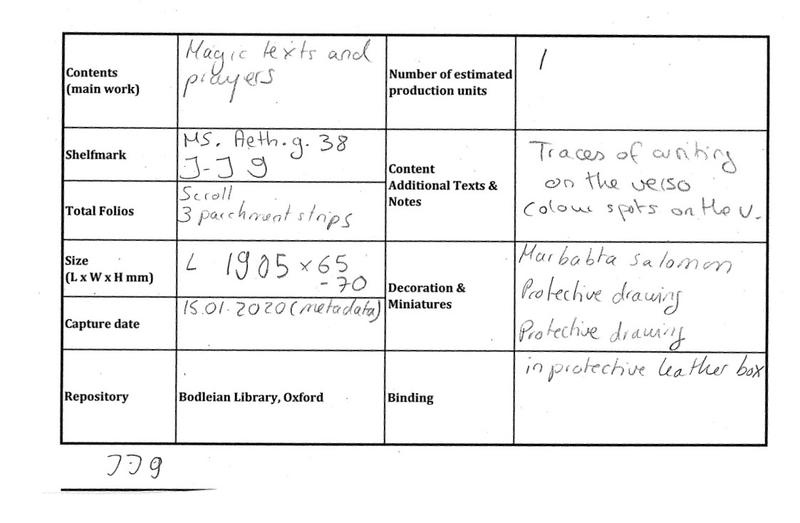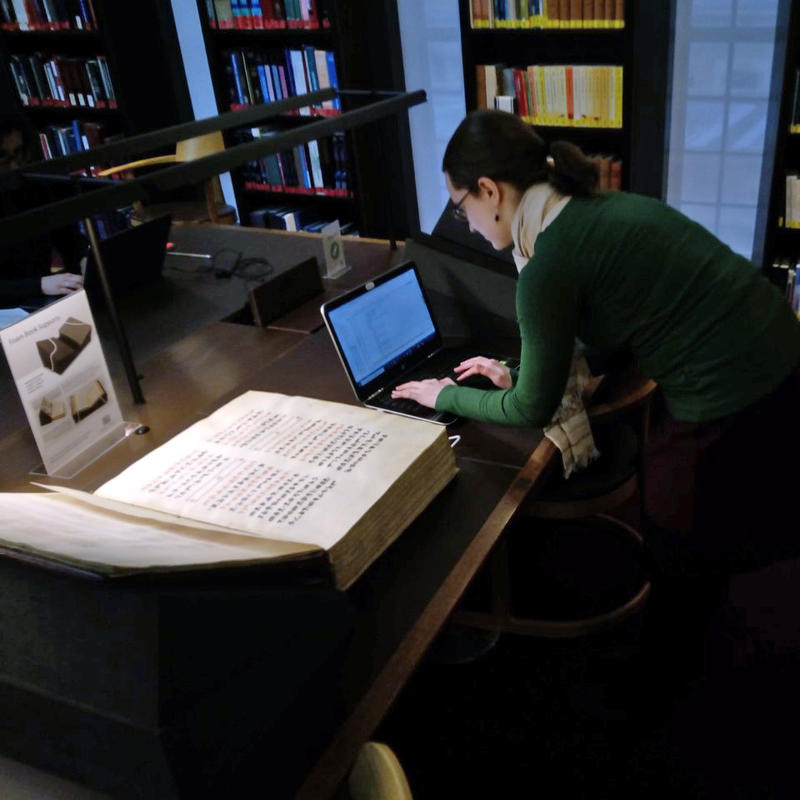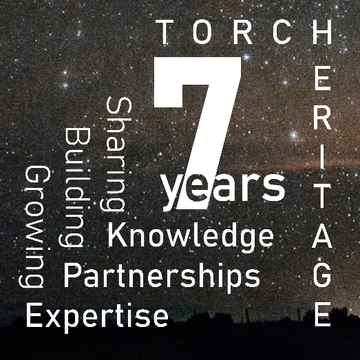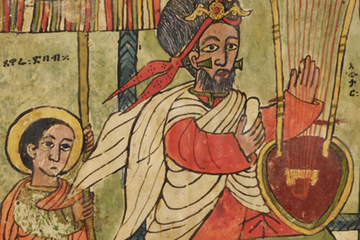Sacred Ethiopic Texts in the Bodleian Library, Oxford
Digitising the Collection
As part of this week’s #TORCHGoesDigital! theme of Storytelling, the TORCH Heritage Programme showcases this project on Ethiopian manuscripts preserved at the Boldeian Libraries. In the current crisis of COVID-19 the benefits of online access to cultural material and digital preservation is more evident than ever before. The collaborative and interdisciplinary character of the project looks beyond that, to enable knowledge exchange and meaningful and varied engagement with the primary material through curating and academic research. The project is a collaboration between the Faculties of Classics and Theology and Religion of the University of Oxford, the Bodleian Libraries, and the Universität Hamburg.
Project Collaborators:
Dr César Merchán-Hamann, Curator of Hebraica and Judaica, Bodleian Libraries, & Director of the Leopold Muller Memorial Library,
Dr Alessandro Bausi, Geschäftsführender Leiter der Abteilung, & Director of the Hiob Ludolf Centre for Ethiopian and Eritrean Studies, Universität Hamburg
Dr Jacopo Gnisci, Getty/ACLS Fellow, University of Oxford
Dorothea Reule, Research Fellow, Universität Hamburg
Dr Phil Booth, A. G. Leventis Associate Professor in Eastern Christianity, University of Oxford
Dr Susanne Hummel, Wiss. Mitarbeiterin, Universität Hamburg
Dr Massimo Villa, Assegnista di Ricerca, Università degli Studi di Napoli "L'Orientale"
Dr Mai Musié, Public Engagement Manager, Bodleian Libraries
This multi-disciplinary and collaborative project has three main aims. First, to study and catalogue a group of about 60 unpublished manuscripts preserved at the Bodleian Libraries in Oxford. Second, to kickstart the digitization of some of these works. And, third, to promote an understanding of the culture and material traditions of the Ethiopian Empire which, at its height, encompassed large areas of modern Ethiopia and Eritrea, and parts of southern Sudan, and, for a short amount of time, western Yemen.
The background of the Project
The project builds on a successful partnership of the ERC Project Monumental Art of the Christian and Early Islamic East – awarded to the late Dr Judith McKenzie, and now led by Professor Bryan Ward-Perkins – the Bodleian Libraries, and members of the Ethiopian and Eritrean diaspora in the UK.[1] This collaboration led to the organization of several conferences on the manuscript tradition of Ethiopia and Eritrea, including The Hidden Gospels of Abba Garima in 2017 and Introducing Manuscripts from Ethiopia and Eritrea in 2018, a number of small exhibitions at the Faculty of Classics and at the Bodleian Libraries, and numerous activity days such as the Ethiopian & Eritrean Discovery Day in July 2018. These activities culminated in 2019 with the organization of the exhibition Languages of God: sacred scripts of Ethiopia and Eritrea which was accompanied by a volume entitled Treasures of Ethiopia and Eritrea in the Bodleian Library, Oxford.
Cataloguing the Bodleian’s Ethiopic Collection
At the beginning of 2020, thanks to the support of the Beta maṣāḥǝft project and the TORCH International Partnership Scheme (through an application presented by Dr César Merchán-Hamann, Dr Alessandro Bausi, Dr Phil Booth, and myself), I spent three weeks studying and documenting a group of about 60 unpublished Ethiopic manuscripts in the Bodleian Libraries together with Dorothea Reule, a researcher from the Hiob Ludolf Centre for Ethiopian and Eritrean Studies. The initial phase of cataloguing, in which you record all the preliminary information about the physical, textual, and visual features manuscript that you will later use to produce a catalogue (Fig. 1), can be quite tiring: some manuscripts are huge and heavy (Fig. 2), while others are so small that you have to squint to see the characters. You must also maintain a high level of concentration throughout the day to make sure you are not missing out on any information that you will later need for the catalogue. So, by the end of this phase, we were both quite worn out!

Figure 1. Sample of metadata for catalogue.

Figure 2. The size of the manuscripts varies. This is one of the larger ones.
For the next phase of the cataloguing project, Dorothea Reule and I have been joined by two other researchers: Dr Susanne Hummel and Dr Massimo Villa, with whom we are currently working to produce the catalogue that we hope to see finished by the end of 2020 and published by 2021. Most of the manuscripts that we are working on were previously in the collection of Dr Bent Juel-Jensen, a former Medical Officer to the University of Oxford, who also published some studies about the most lavishly illustrated pieces in his collection. Dr Juel-Jensen fell in love with Ethiopia after travelling there with the Oxford University Exploration Club in the early 1970s. In 1975 he published a booklet about the expedition together with Geoffrey Rowell titled Rock-hewn churches of eastern Tigray: an account of the Oxford University Expedition to Ethiopia, 1974, where he presented some manuscript he photographed which were previously unknown to Western scholarship. While in Ethiopia, Dr Juel-Jensen asked a local scribe to copy a manuscript of the Book of Enoch which was bequeathed to the Bodleian Libraries together with his other Ethiopic manuscripts in 2006. A note in Ethiopic at the end of this manuscript says that it was written “for Doctor Bent E. Juel-Jensen and his wife Maryam” by the deacon ʾAmḫa Śǝllase.
Digitization the Bodleian’s Ethiopic Manuscripts
In the last decade, the Bodleian Libraries have stepped up their efforts to make their collections accessible to researchers and the general public through a series of initiatives that are in keeping with broader trends in Western institutions and with the EU’s Commission Recommendation of on the digitization and online accessibility of cultural material and digital preservation (27 October 2011). However, to date, none of its Ethiopic manuscripts have been digitized. Realizing that this imbalance needed to be addressed, together with Dr César Merchán-Hamann and Dr Mai Musié from the Bodleian Libraries, I applied for a Heritage Seed Fund to kickstart the digitization of a selection of the Bodleian’s Ethiopic manuscripts and seek further funding to support the initiative. Once the manuscripts have been digitized, they will be uploaded to Digital.Bodleian, together with information about their content and features that will be drawn from the data that has been encoded through the architecture of the Beta maṣāḥǝft project. Digitization is essential for ensuring that these precious documents are preserved, promoted, and made accessible to communities across the globe.
The Impact of COVID-19
The importance of digitizing these precious manuscripts has become even more evident in the midst of the COVID-19 pandemic. Institutions across the world are being asked to provide digital content, but, at the same time, they are facing staff shortages and financial difficulties. This situation has inevitably also had an impact on our planned activities. We have had to postpone the digitization of the Ethiopic manuscript since the Bodleian’s Imaging Department cannot take on new work. Moreover, a conference entitled Collecting Africa: Before, During and After Colonial Overrule that I had organized to present the results of the cataloguing and digitizing projects and reflect, in more general terms, about the presence of objects from Africa in the UK has had to be postponed. The organization of this conference was also kickstarted by financial support by TORCH, though it also received funding from the OCBR, which, I think shows, that it is possible to do a lot even with a limited amount of funds. In organising the conference I drew upon the expertise of an Advisory Committee that included a number of the leading specialists in relevant fields, and I would like to use this opportunity to thank them for their advice, since I could not do so in person. I must especially thank Dr Chris Wingfield, Senior Lecturer in the Arts of Africa at the SRU, who was especially generous with his time and knowledge. I must also thank all the staff at TORCH, especially Dr Anbara Khalidi and Dr Oliver Cox, who have been incredibly supportive throughout the project.
I am hoping that it will be possible to carry out the digitization project and hold the conference in the near future, but at present it is obviously difficult to plan ahead or ask people to commit to a date. In the meanwhile, I have been speaking with my cataloguing colleagues and with some of the conference participants about the possibility of producing some podcasts which will be released by TORCH, so keep an eye on this website if you would like to have more updates about the project’s activities and the heritage of Ethiopia and Eritrea!
[1] A full list of the diaspora members and Bodleian staff involved in these events is given in the acknowledgements section of the Treasures of Ethiopia and Eritrea in the Bodleian Library, Oxford volume.
Jacopo Gnisci is a scholar specialising in medieval manuscript illustration and African art who has recently edited the volume Treasures of Ethiopia and Eritrea in the Bodleian Library, Oxford (2019).
Project Update March 2021
Dr Jacopo Gnisci’s follow-up project Demarginalizing medieval Africa: Images, texts, and identity in early Solomonic Ethiopia (1270-1527) has been awarded an AHRC-DFG grant of roughly €700,000. Find out more here.
TORCH Heritage Programme Homepage


An image of King David from an Ethiopic Psalter. (© Bodleian Libraries)


